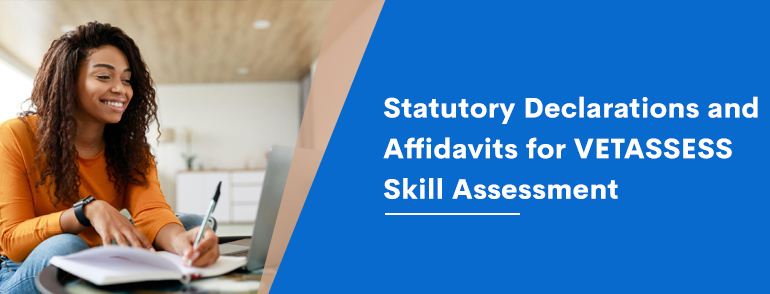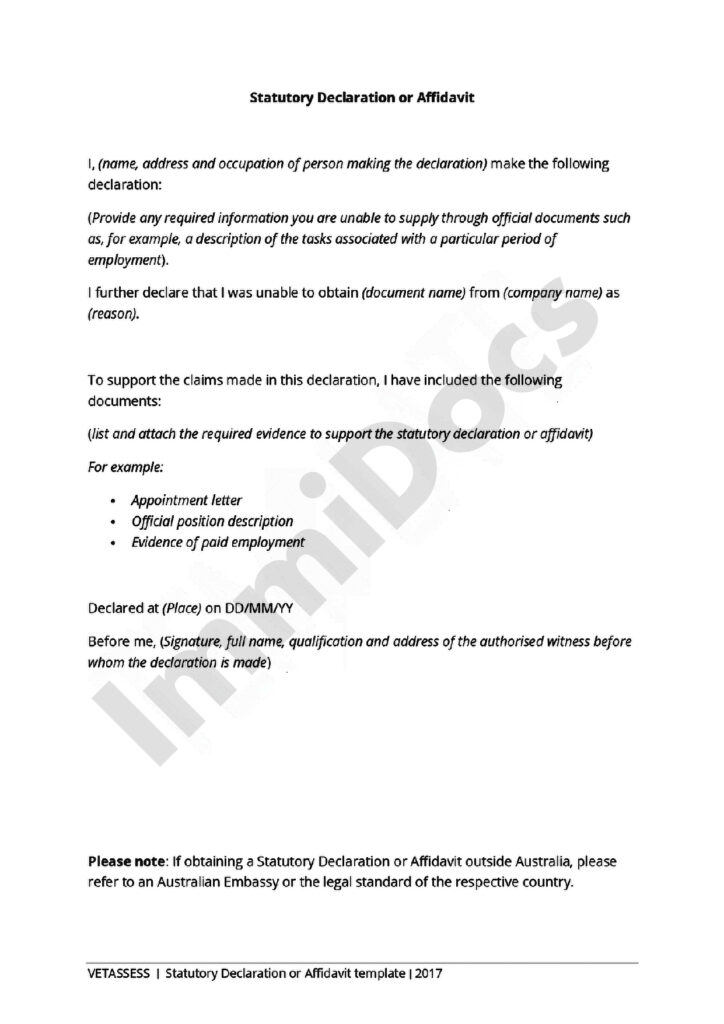Statutory Declarations and Affidavits for VETASSESS Skill Assessment

Statutory Declarations and Affidavits for VETASSESS Skill Assessment
When pursuing your dreams of working or immigrating to Australia, obtaining a VETASSESS skill assessment is crucial. The Australian immigration system requires applicants to prove their qualifications and work experience align with Australian standards for their chosen occupation.
While official documents can provide a strong foundation for your application, situations may arise where you need more formal proof of specific work experiences or qualifications. This is where statutory declarations and affidavits come into play.
A Statutory Declaration and an Affidavit are legal documents that provide a written statement or testimony under oath. These documents are often required for various official purposes, including VETASSESS skill assessments for immigration and employment purposes in Australia. They verify the accuracy and authenticity of the information provided by the applicant.
This article will dig into the world of statutory declarations and affidavits for VETASSESS skill assessments, giving you the information you need to navigate this process successfully.
1. Navigating the VETASSESS Skill Assessment Process
a. Getting to Know the VETASSESS Skill Assessment Process
The VETASSESS skill assessment is crucial if you aim for skilled migration or career advancement in Australia. The process consists of these essential stages:
- Sending Your Application: You submit your application with the required supporting documents.
- Checking Your Documents: VETASSESS reviews your documents to ensure they’re genuine and relevant.
- Evaluating Your Skills: They in-depth assess your qualifications, work history, and skills.
- Getting the Result: You receive a notification about your assessment outcome, determining your eligibility for migration or professional recognition.
b. The Power of Accurate and Relevant Supporting Documents
In your VETASSESS journey, the supporting documents you provide carry much weight. Here’s why they’re so important:
- Building Trust: Giving accurate documents shows you’re trustworthy and serious about your application.
- Showing Your Qualifications: VETASSESS needs these documents to understand your qualifications and work experience accurately.
- Making the Assessment Right: Relevant documents clearly show your skills, leading to a more accurate assessment result.
- Meeting the Standards: By giving the right documents as per VETASSESS rules, you avoid delays or rejections.
Remember these tips for a smooth assessment experience when submitting your documents:
- Cover Everything: Include all necessary documents, like academic records, work references, and professional certificates.
- Check for Accuracy: Ensure the information in your documents is correct to avoid confusion.
- Stay Relevant: Focus on documents that match VETASSESS skill assessment criteria, emphasizing qualifications and experiences related to your chosen profession.
2. Role of Statutory Declarations in VETASSESS Skill Assessment
Statutory declarations play a vital role in the VETASSESS skill assessment process, which is crucial for individuals eyeing opportunities in Australia’s skilled migration or professional growth in the ICT (Information and Communication Technology) sector.
a. Purpose of Statutory Declarations
In the world of immigration and employment, statutory declarations hold immense importance as they substantiate applications and provide vital details. Specifically for the VETASSESS skill assessment, a statutory declaration serves as a formal written statement where you outline your employment history, roles, responsibilities, and ICT-related skills. It is solid evidence of your work experience, ensuring alignment with VETASSESS criteria.
The significance of a statutory declaration comes into play when you can’t secure an employment reference letter or the one you have doesn’t meet VETASSESS requirements. It empowers you to showcase your expertise in a legally recognized manner, aiding the evaluation of your suitability for migrating to Australia or working in its ICT industry.
b. Differentiating Statutory Declarations from Other Statements
Their legal weight and specific requirements set statutory declarations apart from regular statements. Unlike a casual statement, a statutory declaration is a formal document that holds legal validity when signed in the presence of a designated witness. It requires you to affirm solemnly the accuracy of your provided information.
Unlike an employment reference letter, usually issued by your employer, a statutory declaration is self-declared. It lets you directly present your skills, work history, and relevant details. This unique aspect makes a statutory declaration a more personal and direct way to communicate your abilities and experience.
c. When and how to use Statutory Declarations?
Statutory declarations for VETASSESS skill assessment are commonly employed in the following scenarios:
- Unobtainable Employment Reference Letter: When you can’t get an employment reference letter from a past employer – whether due to non-cooperation, company closure, or other reasons – a statutory declaration comes to your rescue as proof of your work history.
- Inadequate Employment Reference Letter: If your employment reference letter doesn’t meet VETASSESS standards – maybe it lacks details or isn’t on official letterhead – a statutory declaration can bridge the gap and fulfill the assessment requirements.
- Self-Employed or Independent Contractors: Those who’ve been self-employed or worked as independent contractors might find obtaining a traditional employment reference letter challenging. A statutory declaration is a suitable alternative to demonstrating your skills and experience in such cases.
Leveraging a statutory declaration enables you to fulfill VETASSESS skill assessment requirements, provide a comprehensive work experience overview, and fortify your case for migrating or working in Australia’s vibrant ICT industry.
Learn More: Do you want expert help in the lodgment process? 💪🏽💪🏽
3. Role of Affidavits in VETASSESS Skill Assessment
Affidavits are vital in the VETASSESS skill assessment process, serving as essential proof and reinforcement for applicants. These legally binding written statements, signed by an authorized witness, validate specific claims and situations.
Affidavits offer applicants a way to provide additional information or back up their skills and experience when traditional documentation like employment reference letters isn’t accessible or falls short.
a. Understanding the Importance of Affidavits in VETASSESS Skill Assessment
Affidavits carry significant weight in the VETASSESS skill assessment process. They enable applicants to furnish evidence and bolster claims that other documents might not fully capture. This is especially valuable when showcasing specialized skills, experience in niche fields, or work in unique conditions. Affidavits serve as a legally recognized method to validate these assertions, lending credibility and robustness to the VETASSESS skill assessment application.
b. Instances Requiring Affidavits for Specific Claims or Situations
Certain situations within the VETASSESS skill assessment might necessitate an affidavit to support specific claims or circumstances. For instance, if an applicant has engaged in non-traditional work arrangements, such as freelance or contract work, an affidavit can validate their roles, responsibilities, and accomplishments.
Likewise, for those encountering challenges in obtaining employment reference letters, an affidavit can stand as an alternative avenue to showcase skills and experience. Addressing gaps in employment history or explaining discrepancies can also benefit from the clarity provided by an affidavit.
c. Distinguishing Characteristics of Statutory Declarations and Affidavits
Statutory declarations and affidavits have distinct features, setting them apart. Although both are legally binding written statements, affidavits usually involve sworn oaths and may entail more formal processes, including notarization.
In contrast, statutory declarations often substitute specific documents like employment reference letters and might not necessitate an oath or notarization. Understanding the VETASSESS requirements and guidelines for the skill assessment process helps determine whether a statutory declaration or an affidavit aligns better with the situation.
Read More: What are the common mistakes in the VETASSESS skill assessment application? 💡💡
4. Writing a Statutory Declaration for VETASSESS Skill Assessment

A well-crafted statutory declaration can bolster the credibility and potency of your VETASSESS skill assessment application. Mastering and preparing a statutory declaration for VETASSESS requires meticulous attention to detail and adherence to the assessment guidelines.
Here’s a step-by-step roadmap to ensure your statutory declaration is comprehensive and precise.
a. Step-by-Step Guide to Writing a Statutory Declaration
- Introduction: Start by introducing yourself, including your full name, contact information, and identification numbers specified by VETASSESS.
- Personal Particulars: Include your date of birth, nationality, and current residential address.
- Work History: Provide an in-depth overview of your work journey, mentioning the names of companies, job titles, employment durations, and succinct descriptions of your roles and responsibilities.
- Educational Credentials: Emphasize any degrees, certifications, or pertinent educational qualifications that underscore your skills and expertise.
- Addressing Gaps: If gaps in your work history exist, explain each gap clearly.
- Supporting Documentation: Whenever possible, attach supporting documents like pay slips, tax reports, or bank statements that validate your work experience and employment history.
2. Inclusion of Essential Details
When preparing your statutory declaration for the VETASSESS skill assessment, including essential particulars is vital. This involves sharing personal information such as your full name, contact details, and any identification numbers required by VETASSESS.
Provide a comprehensive work history encompassing company names, job titles, employment durations, and concise portrayals of your roles and responsibilities. Remember to incorporate relevant qualifications, degrees, certifications, or educational achievements that testify to your prowess.
C. Tips for Precision, Completeness, and Adherence to VETASSESS Guidelines
To ensure your statutory declaration aligns with VETASSESS precision, completeness, and guidelines, bear these tips in mind:
- Study VETASSESS Guidelines: Familiarize yourself with VETASSESS’ specific stipulations and directions for the skill assessment process.
- Thoroughly Validate Information: Ensure all personal details, work history, and qualifications are accurate and current.
- Strive for Conciseness: Provide ample details to showcase your abilities and experience while avoiding excessive embellishment or verbosity.
- Seek Professional Aid if Necessary: If you’re uncertain about preparing the statutory declaration, consider seeking guidance from a seasoned professional like an immigration consultant or a lawyer well-versed in VETASSESS skill assessments.
These strategic steps and pointers empower you to create a meticulously accurate statutory declaration for your VETASSESS skill assessment application, amplifying the likelihood of a successful outcome.
5. Crafting a Compelling Affidavit for VETASSESS Skill Assessment
Creating an impactful VETASSESS skill assessment can bolster your application’s credibility. An affidavit is a legally binding written statement that validates specific claims and circumstances. By adhering to these guidelines, you can shape an influential affidavit that elevates the strength of your VETASSESS skill assessment.
a. Determining the Need for an Affidavit over a Statutory Declaration
Affidavits come into play when you require detailed, sworn evidence to substantiate particular claims or situations. Opt for an affidavit when presenting more formal and legally binding documentation becomes necessary.
b. Meeting Legal Prerequisites for a Valid Affidavit
Crafting an affidavit for the VETASSESS skill assessment entails fulfilling the legal prerequisites for its validity. Though specifics may vary by jurisdiction; generally, a valid affidavit should encompass:
- A heading that identifies it as an affidavit.
- A truthful statement, often starting with phrases like “I solemnly declare” or “I swear,” followed by your name.
- Your signature and the date, ideally witnessed by an authorized individual,
- Clear identification of the affiant (the person making the affidavit).
- Sequential paragraph numbering.
- Presentation of facts in a clear, concise, and organized manner.
c. Guidelines for Formulating a Persuasive and Impactful Affidavit to Support Claims
To draft a persuasive and impactful affidavit for the VETASSESS skill assessment heed these guidelines:
- Commence with Clarity: Introduce yourself, state your qualifications, and briefly outline the affidavit’s purpose.
- Present Facts and Evidence: Present the specific claims or situations you’re addressing. Back them up with substantial evidence, such as employment contracts, letters, or official documents.
- Logical Information Flow: Organize your affidavit into paragraphs that tackle distinct points or claims. Use headings or subheadings for enhanced clarity.
- Concision and Precision: Employ clear and concise language. Avoid irrelevant details or opinions, focusing solely on pertinent facts directly supporting your assertions.
- Maintain a Professional Tone: Maintain a formal and professional tone throughout the affidavit. Ensure your language is precise and accurate.
- Legal Consultation: When in doubt about the legal aspects of creating an affidavit, consider seeking counsel from a legal expert well-versed in VETASSESS skill assessments.
By adhering to these strategic guidelines, you can fashion an effective affidavit that convincingly supports your claims, enriching your VETASSESS skill assessment application’s impact.
6. Unsuitable Assessment of Statutory Declarations of Affidavits
The assessment process for statutory declarations or affidavits may be considered unsuitable if the applicant fails to furnish adequate proof of paid employment. It’s essential to be mindful that supporting evidence like cash payments, employment contracts, appointment letters, or position descriptions will not be accepted.
Using statutory declarations or affidavits instead of job references is contingent upon the scrutiny and discretion exercised by the ACS. It’s important to highlight that the Department of Home Affairs will meticulously review these documents to prevent fraud and plagiarism.
Essential Considerations to Avoid Unacceptable Statutory Declarations or Affidavits
To ensure that your statutory declarations meet the requisite standards and do not fall into the category of unacceptable evidence take note of the following points:
- Declarations provided by junior colleagues will not be recognized as valid evidence.
- A mere assertion of agreement between the referee and the requester regarding the content of another document requires revision for enhanced accuracy.
- The presence of a Notary Public’s stamp and signature is not sufficient proof that the referee’s signature has been properly witnessed.
- The Notary Public’s signature indicates that the document is a verified copy and does not verify the witnessing of the referee’s signature.
- Declarations without proper witnessing on the same day they were signed will be deemed unsuitable.
- Replicating job duties directly from the Australian and New Zealand Standard Classification of Occupations (ANZSCO) will not be accepted as valid supporting evidence.
By staying mindful of these considerations and ensuring that your statutory declarations or affidavits align with the designated criteria, you can significantly enhance the suitability and credibility of your application for ACS skill assessment.
Sample Template of Statutory Declaration and Affidavits

Conclusion
When applying for a VETASSESS skill assessment, carefully preparing well-detailed statements like Statutory Declarations and Affidavits is crucial. These documents significantly affect how credible your application appears. Following the guidelines outlined in this blog post can significantly improve your chances of a successful assessment.
Remember, it’s essential to thoroughly review the VETASSESS guidelines and consider getting professional help to accurately and effectively create your Statutory Declaration or Affidavit. Please contact us for a free consultation if you need assistance with your skill assessment and lodgement.

